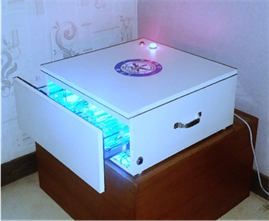Coronavirus survives on banknotes for long

Coronavirus survives on banknotes for long
New Delhi: The novel coronavirus responsible for COVID-19 may survive for up to 28 days on common surfaces including banknotes, glass — such as that found on smart phone screens — and stainless steel, according to a laboratory study by Australia’s national science agency.
The finding, published in the Virology Journal, shows that SARS-CoV-2 can remain infectious on surfaces for long periods of time, reinforcing the need for good practices such as regular hand washing and cleaning surfaces.
The research, undertaken at the Australian Centre for Disease Preparedness (ACDP), found that SARS-CoV-2 survived longer at lower temperatures and on non-porous or smooth surfaces such as glass, stainless steel and vinyl, compared to porous complex surfaces such as cotton.
The study – ‘The effect of temperature on persistence of SARS-CoV-2 on common surfaces’ conducted by a team of researchers including Shane Riddell, Sarah Goldie, Andrew Hill, Debbie Eagles and Trevor W Drew was published in Virology Journal on October 7, 2020.
The study measured the survival rates of infectious SARS-CoV-2, suspended in a standard ASTM E2197 matrix, on several common surface types. All experiments were carried out in the dark, to negate any effects of UV light. Inoculated surfaces were incubated at 20 °C, 30 °C and 40 °C and sampled at various time points. The findings demonstrate SARS-CoV-2 can remain infectious significantly longer time periods than generally considered possible.
Coronavirus survives on banknotes for long
The researchers found that the novel coronavirus survived longer on paper banknotes than plastic banknotes. The persistence on glass is an important finding, given that touchscreen devices such as mobile phones, bank ATMs, supermarket self-serve checkouts and airport check-in kiosks are high touch surfaces which may not be regularly cleaned and therefore pose a transmission risk of SARS-CoV-2. The study demonstrates that SARS-CoV-2 is extremely stable on stainless steel surfaces at room temperature (> 28 days at 20 °C/50%RH) however, is less stable at elevated temperatures (7 days at 30 °C and
The persistence of both SARS and SARS-CoV-2 on cotton has been demonstrated to be significantly shorter than on non-porous surfaces. The data presented in this study demonstrates that infectious SARS-CoV-2 can be recovered from non-porous surfaces for at least 28 days at ambient temperature and humidity (20 °C and 50% RH). Increasing the temperature while maintaining humidity drastically reduced the survivability of the virus to as little as 24 h at 40 °C.






